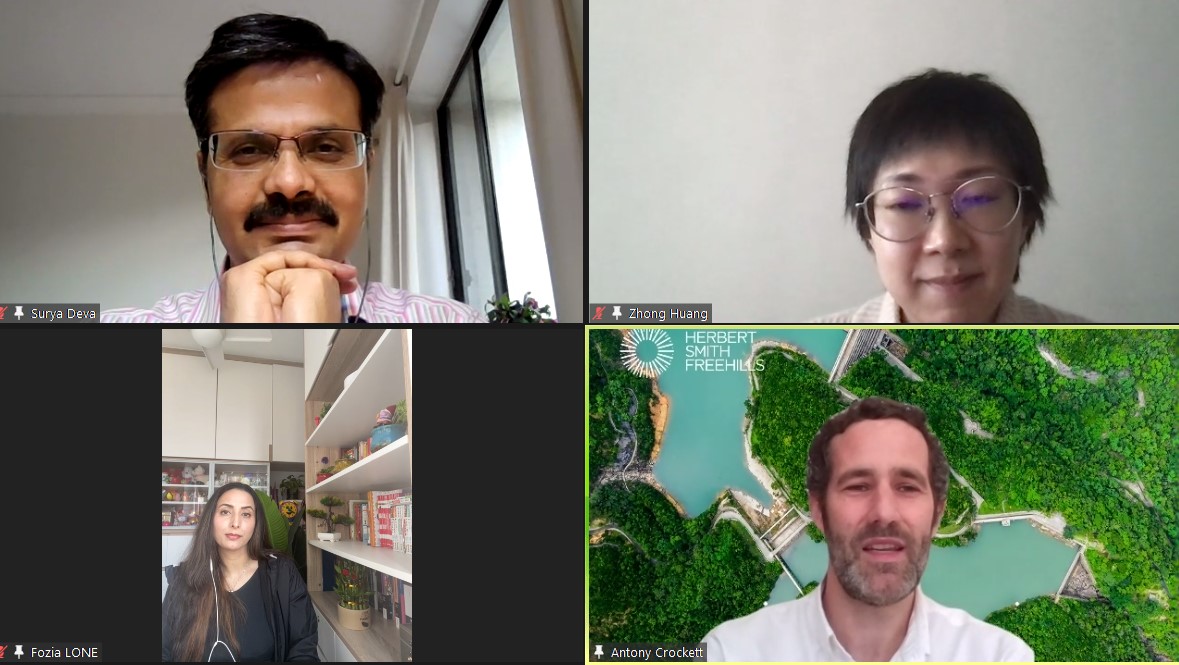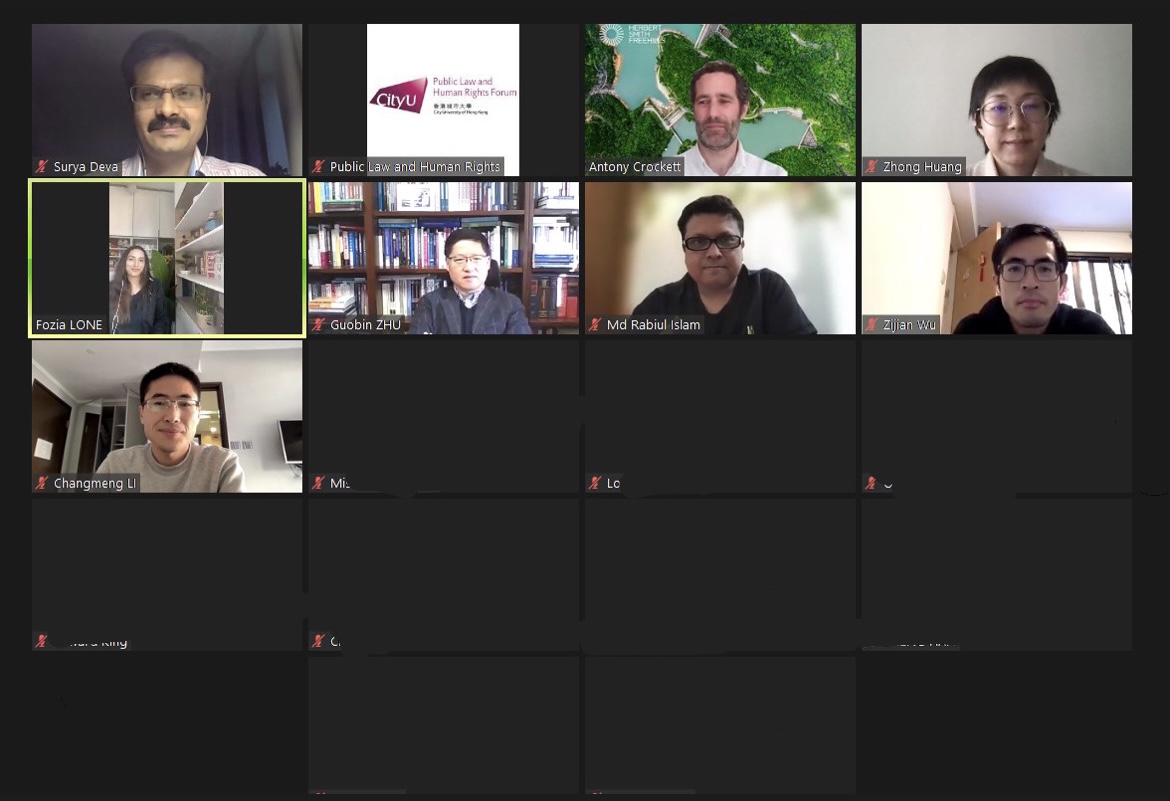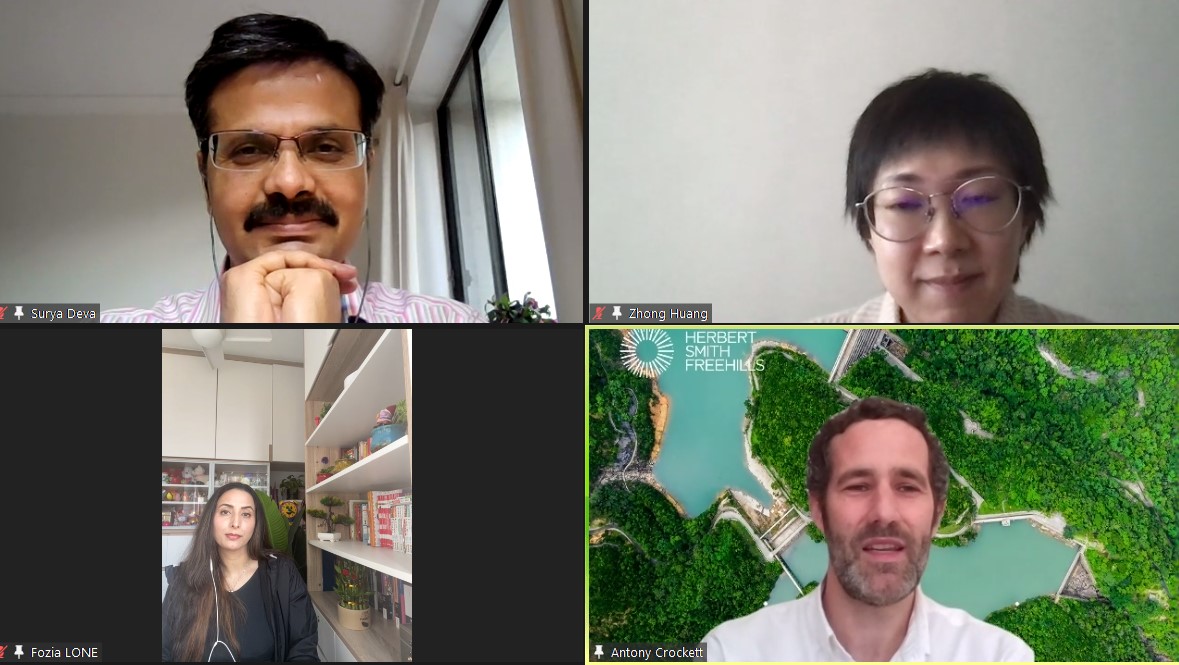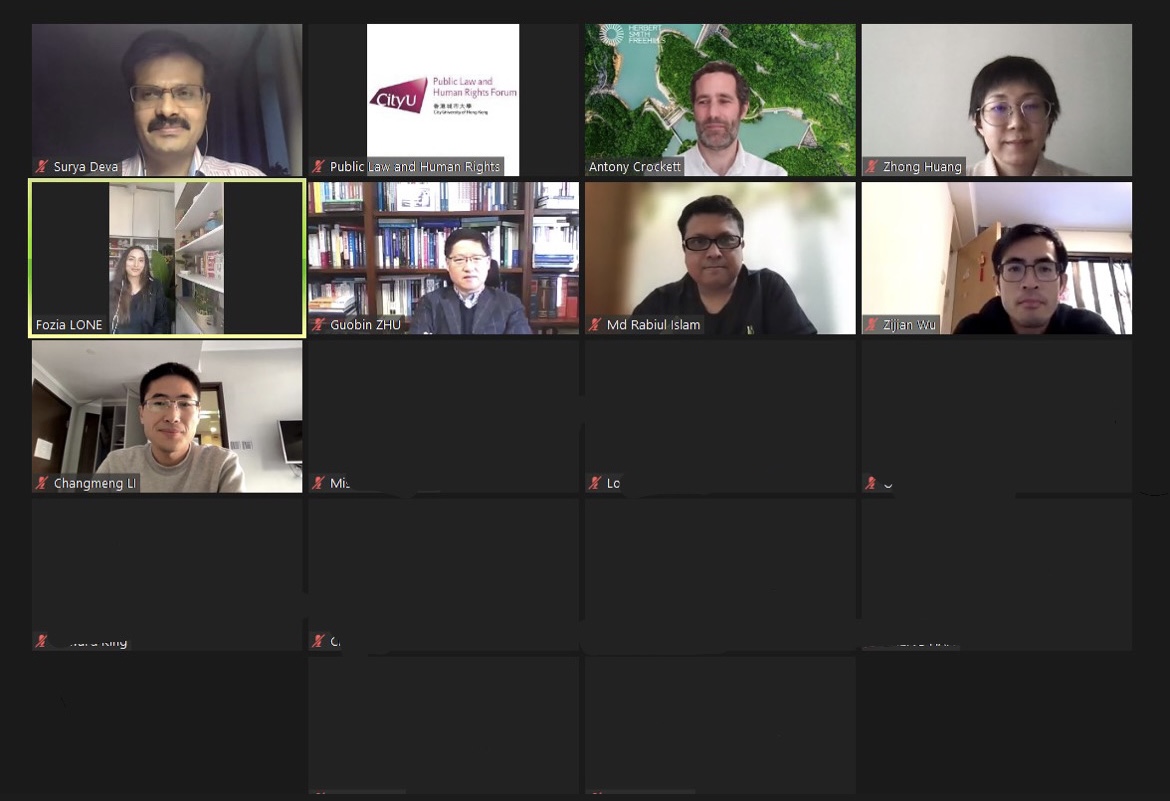Latest News
CPLR Webinar - "Business and Human Rights Standards: Relevance for Law Students"
The United Nation (UN) Guiding Principles on Business and Human Rights (BHR) was unanimously endorsed by the UN Human Rights Council in June 2011. The principles recognize all business enterprises’ obligations to respect all internationally recognised human rights wherever they operate. On 03 March 2022, the Public Law and Human Rights Forum (CPLR) at the School of Law, City University of Hong Kong hosted the titled webinar to discuss the principles’ impacts on business enterprises and how it relates to law students’ professional careers.

First Row- Dr. Surya DEVA, Dr. Zhong HUANG
Second Row- Dr. Fozia Nazir LONE, Mr. Antony CROCKETT
The webinar was moderated by Dr. Fozia Nazir LONE (Associate Professor, School of Law, City University of Hong Kong; Associate Director, CPLR). She welcomed all participants and introduced the three distinguished panellists: Dr. Zhong HUANG (Greater China Researcher and Representative, Business & Human Rights Resource Centre), Dr. Surya DEVA (Adjunct Professor, School of Law, City University of Hong Kong; Professor, Macquarie Law School; Member, UN Working Group on Business and Human Rights) and Mr. Antony CROCKETT (Partner, Herbert Smith Freehills; Lawyer tri-qualified in Australia (Victoria), England & Wales and Hong Kong SAR). Dr. Fozia Nazir LONE expressed the great honour to have the three outstanding panellists here and outlined that they will address human rights abuses committed in business operations, influence and implementation of UN Guiding Principles on BHR, and its impact on legal practice respectively. She observed that human rights standards play an important role in legal practice but is often omitted by law students. This webinar is dedicated to expose law students to the relevance of BHR standards to their future career.
Dr. Zhong HUANG explained the relationship between business development and human rights protection through analysing different industrial supply chains. To reduce production cost, MNCs tend to outsource their mining and manufacturing procedures to developing countries, and buy parts from these countries’ factories. They have long been criticised for not taking positive steps to deal with the sweatshop conditions exist in their supplier’s factories and labour exploitation in the process of mining raw materials. For instance, in Democratic Republic of Congo, workers were paid less than two dollars per day. The aluminium and nickel value chain were then discussed. She highlighted that making sure industrial supply chains are operating in accordance with the UN Guiding Principles on BHR is the key to assist developing countries in achieving sustainable development. She added in China, there is usually no formal contract between workers and the factory. Some factory even forced the migrant workers to continue to work without sufficient protection under the pandemic by holding their passport. She addressed that the labour’s human rights protections are actually guaranteed in the Chinese labour law, but the enforcement of which still needs to be improved.
Dr. Surya DEVA indicated that business enterprises responsibilities are not merely maximizing profits for shareholders, but also safeguarding human rights. Their responsibility exists once their businesses cause, contribute to or be directly linked to adverse impacts. On the other hand, states must ensure that corporations are not violating human rights by taking appropriate steps to investigate and punish corporations that fails to respect human rights within their jurisdiction. Access to effective remedy also needs to be guaranteed. He highlighted that the UN Guiding Principles has influenced countries to adopt measures protecting human rights. For example, the Law on the Corporate Duty of Care in Supply Chains implemented by Germany and the Directive on Corporate Sustainability Due Diligence released by the European Commission last month. He emphasised that law students can only advice their future clients competently if they look beyond hard law and business enterprises’ own operations and territories.
Mr. Antony CROCKETT shared that in the commercial world, nobody really focused on human rights in the past. Nowadays, it is common for business enterprises like the Big Four accountancy firms to seek human rights advice from international law firms. International law firms have been actively recruiting human rights specialists to meet the increasing requests in preparing business enterprises’ human rights policy, conducting human rights due diligence and advising on how company’s commitments declared to respect human rights can be implemented in a practical sense. He believed that this practice area will continue to grow.
The webinar ended with Dr. Fozia Nazir LONE’ s closing remarks. On behalf of CPLR, she once again expressed her gratitude to the panellists for giving inspiring presentations and to all the audience for their participations which made the webinar a great success.

聯合國商業與人權指導原則於 2011 年 6 月獲得聯合國人權理事會的一致認可。這些原則承認所有企業有義務在其經營的任何地方尊重所有國際公認的人權。2022 年 3 月 3 日,香港城市大學法學院的公法與人權論壇舉辦了此網絡研討會,討論這些指導原則對企業的影響以及這些影響與法科學生職業生涯的關係。

第一行 : Surya DEVA博士,Zhong HUANG博士
第二行: Fozia Nazir LONE 博士,Antony CROCKETT先生
網絡研討會由 Fozia Nazir LONE 博士(香港城市大學法學院副教授;公法與人權論壇副主任)主持。她歡迎所有與會者並介紹了三位傑出的講者:Zhong HUANG博士 (企業責任資源中心大中華區研究員和代表),Surya DEVA博士(香港城市大學法學院客座教授;澳洲麥考瑞大學法學院教授;聯合國工商業與人權工作組成員) 及Antony CROCKETT 先生(史密夫斐爾律師事務所合夥人;獲澳大利亞(維多利亞)、英格蘭和威爾士以及香港特別行政區 律師資格) 。Fozia Nazir LONE 博士表示非常榮幸三位講者能來到這裡,並概述他們將分別討論在商業運營中的侵犯人權行為,如何實施聯合國指導原則和其影響,及這些原則對法律從業者的影響。她觀察到人權指導原則在法律實踐中發揮著重要作用,但經常被法科學生忽略。此網絡研討會旨在讓法學院學生了解商業和人權指導原則及與其未來職業的相關性。
Zhong HUANG 博士通過對不同產業供應鏈的分析,闡釋了企業發展與人權保護的關係。為了降低生產成本,跨國公司傾向從發展中國家工廠購買所需零件,並將採礦和製造程序外包給他們。長久以來,此類企業一直被批評沒有採取積極措施來應對供應商的血汗工廠和開採原材料過程中過度剝削勞動力的問題。例如,在剛果民主共和國,工人每天的工資只有不到兩美元。她接著討論了鋁和鎳的價值鏈。她強調,確保工業供應鏈按照聯合國的指導原則運行是幫助發展中國家實現可持續發展的關鍵。她接著補充在中國,工人和工廠之間通常沒有正式的合同。在疫情下,一些工廠甚至通過扣留護照強迫農民工在沒有足夠防疫措施及保護的情況下繼續工作。她表示,中國的勞動法確實保障了勞動者的人權,但在執行方面仍有待加強。
Surya DEVA博士指出工商企業的責任不僅是為股東爭取最大的利潤,他們亦需要維護人權。他們有責任解決由他們的業務造成、促成或與其相關的對人權不利的影響。另一方面,各國必須通過採取適當措施調查和懲罰在其管轄範圍內不尊重人權的企業,並確保相關員工能經有效上報途徑獲得補償。他指聯合國指導原則鼓勵了了各國採取保護人權的措施。例如,德國實施的《企業供應鏈注意義務法》和歐盟委員會上個月發布的《企業可持續發展盡職調查指令》。他強調,法律學生在未來為客戶提供建議時,需多注意法律以外的指導性文件與原則,及商業企業自身運營領域以外的國際條例。
Antony CROCKETT先生分享過去在商業世界中,人權法及相關原則並未得到真正的重視。如今,企業如四大會計師事務所等紛紛向國際律師事務所尋求人權建議。國際律師事務所近年亦一直在積極招聘人權律師及專家,以滿足客戶日益增加在人權保障方面的要求,例如製定企業人權政策、進行人權盡職調查以及就如何落實公司的尊重人權承諾提供建議 。他相信未來人權保障這個領域將會在法律實踐中不斷發展壯大。
網絡研討會以 Fozia Nazir LONE 博士的閉幕詞結束。她代表CPLR再次感謝小組成員的精彩演講和所有觀眾的參與,使網絡研討會取得圓滿成功。
